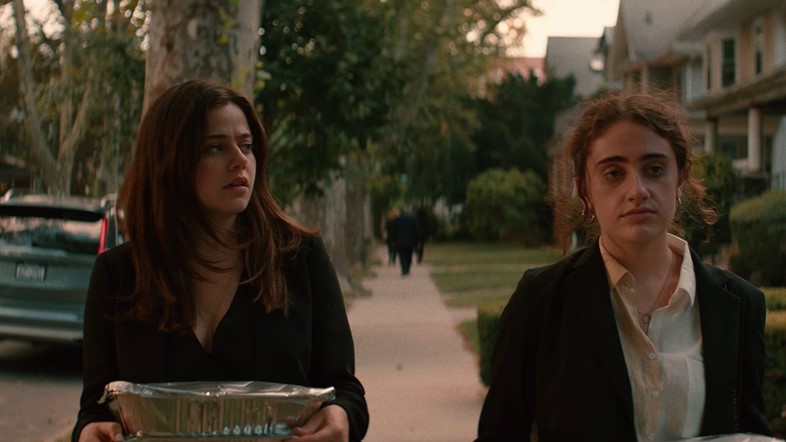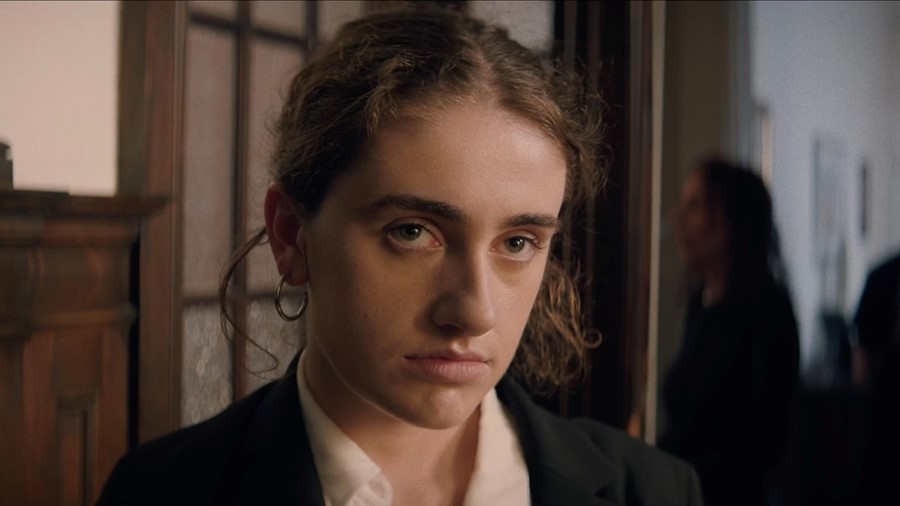As Shiva Baby is released, writer and director Emma Seligman tells Zoe Whitfield about the process of making the Jewish comedy – and who she made it for
“Rachel sent that to me!” exclaims Emma Seligman, the writer and director of the new awkward Jewish comedy, Shiva Baby. Seligman was still in the press cycle for her debut feature film when a second project (Bottoms) with the former’s lead, Rachel Sennott, was announced in April and quickly secured its own Letterboxd page: “Gerwig/Ronan walked so Seligman/Sennott could run,” reads one standout quote. “I mean, I hope Rachel and I continue to get to make movies together; the comparison is really flattering,” she remarks. “It’s nice that we have fans already.”
Shot in New York in August 2019, Shiva Baby emerged from an eight-minute short of the same name produced by the Canadian filmmaker while in her final year at NYU – which also starred Sennott. “Rachel was the person who encouraged me the most to make the feature film, she’s very good with goal setting, planning and organising,” Seligman tells AnOther of the film’s collaborative streak and the accountability the pair’s close friendship provided. “She checked in with me constantly, would ask if the script was done and give me notes.”
Characterised by a steady stream of close ups that feed the picture’s palpable claustrophobia, Shiva Baby opens with Danielle (Sennott) leaving the chic apartment of her sugar daddy (Danny Deferrari), a man who “thinks it’s great to support females, particularly female entrepreneurs of the future,” wrongly believing their transaction is helping Danielle put herself through law school. (In fact, her parents bankroll her lifestyle while her major is self-curated and feminism-led.) The lie continues as she describes brunch plans with another client, instead meeting her parents to attend a shiva for a woman who used to play bridge with her bubbe. Barely inside the house, she runs into her academically-inclined ex-girlfriend Maya (Molly Gordon), while the secondhand anxiety gains further traction when her sugar daddy shows up, closely followed by his shiksa princess-cum-girlboss wife (Dianna Agron), and their young baby.

“We started to craft Danielle together,” Seligman recalls of Sennott’s pivotal role in the development of the film’s protagonist. “When we made the short film, I was putting a lot of myself into that character and what I was feeling at the time. Rachel kind of but didn’t fully relate to Danielle, and then over the course of the two years, as I put myself fully in the headspace of making the movie and got further away from those insecurities and those experiences, Rachel unfortunately had to start going through it based on our timing, so Danielle became more her than me; it was like I was giving her away to her.”
The cooperation of the wider cast – which includes Polly Draper, Fred Melamed and Jackie Hoffman – further underscored the collaborative nature of the film, which Seligman describes as having been made with “no time and no money” over an uncomfortably hot summer, and with a relentlessly tearful baby in tow: “we had to rewrite scenes on the spot that would accommodate him crying.” In fact, it was Draper who suggested the Baby Shake song which Danielle’s parents perform in a particularly excruciating scene in the film’s latter half (Draper had sung it to her own kids when they were young).
“A lot of actors suggested things that I felt went against my vision,” Seligman says, “but it felt important to accept ideas and changes, and to work with things as they go. Polly really pushed for her character to have more of an understanding of what her daughter was going through and I wanted her to stay oblivious, so I was surprised by the end how many of her ideas I ended up taking, and how much worked within the film. The song ended up becoming a really fun day of shooting. And the baby crying too, helped us so much because it changed the tone of the movie quite drastically.”
When she first began writing the film Seligman’s reference points were mostly Jewish romantic comedies such as Crossing Delancey, Keeping the Faith and Kissing Jessica Stein; as production began, her viewing habits grew to include psychological thrillers like Krisha and Opening Night (scored with strings by Ariel Marx, the film’s soundtrack asserts itself like a horror). Ultimately however, it’s personal experiences that shaped Shiva Baby’s unique point of view. Beyond the Seeking Arrangement narrative – the sugar daddy/mommy site used by her classmates in New York – the director reproduced dialogue picked up from attending shivas in her native Toronto (from which the heavy focus on food and Danielle’s weight arrived), elsewhere referencing select elements of her life to inform the production.
“Polly Draper met my mum – I knew I wanted big glasses for her character – but when she saw my mum she honed in on her glasses and became obsessed with recreating certain elements of how she looked,” she remembers. “Personal touch helps when you’re creating characters, because if they’re more authentic the easier it is to direct and write. But I didn’t specifically draw from my life, I just pulled from experience when it was helpful to move the story along or give it more texture.” One such moment will perhaps barely register to many viewers, but serves as a sweet reminder of the film’s evolution, as Danielle’s phone flashes and we see her wallpaper is a picture of Sennott and Seligman. “We were stressed that day and couldn’t figure out a background for the phone, so we just decided to pick one of us two as a joke, for Rachel and I.”
Ruminating on power structures in relation to sex and performing adulthood, as well as the familiarity of Danielle’s uneasiness when placed back in the setting of an extended family gathering, Shiva Baby has the potential to speak to a broad audience. Inserting the storyline between Maya and Danielle specifically for the feature iteration however, was a nod to her sexuality and intended audience, explains Seligman. “Honestly, I wanted to make it for young queer women, or young women in general. I mean to be more specific it was bisexual women. And I’ve been really encouraged and excited by the fact that most of the people who’ve reached out to me – from the festival circuit but also now – have been young bisexual women.”
